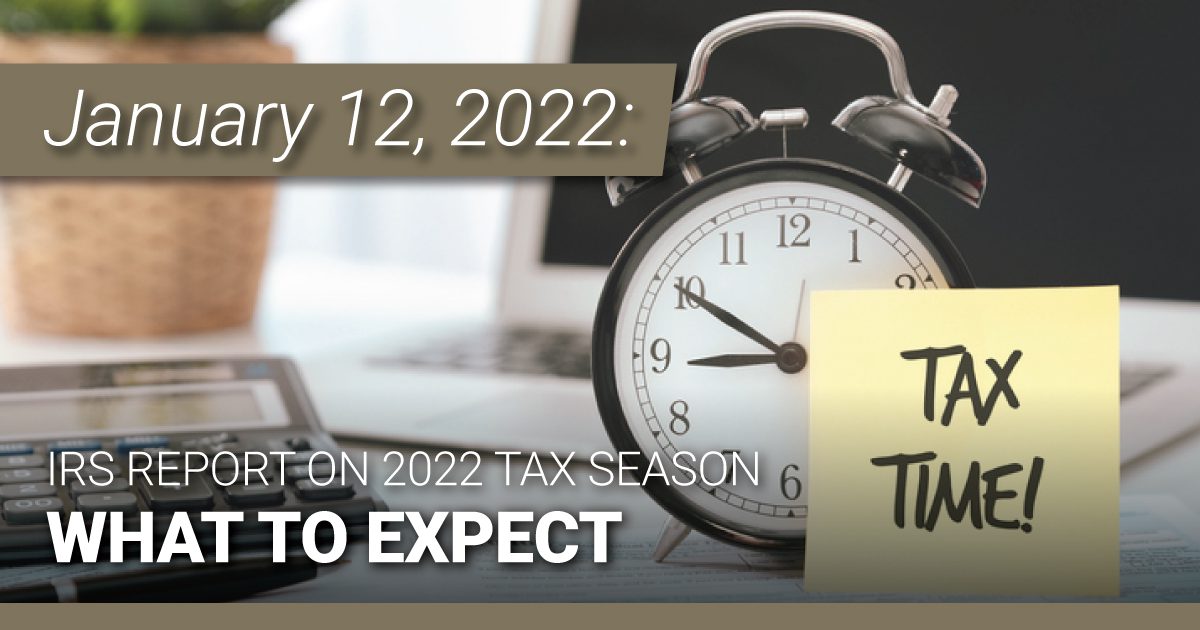IRS Report on 2022 Tax Season – What to Expect

The IRS announced January 24th as the date they will start accepting and processing 2021 income tax returns, but brace yourself for potentially sluggish service as the underfunded, understaffed, and backlogged IRS juggles another filing season, Treasury officials said.
“In many areas, we are unable to deliver the amount of service and enforcement that our taxpayers and tax system deserve and needs. This is frustrating for taxpayers, for IRS employees, and for me,” said IRS Commissioner Chuck Rettig.
The 2022 filing season arrives as Capitol Hill negotiations over the Biden administration’s Build Back Better bill seem stalled. The bill would include adding $80 billion over a decade to the IRS budget for more staff and better technology to catch tax cheaters, as well as funding to improve customer service. The Build Back Better bill would have also renewed the enhanced child tax credit payments through 2022, possibly retroactively increasing the State and Local Income Tax (SALT) cap to $80,000 to 1/1/2021, among other items.
“Planning for the nation’s filing season process is a massive undertaking, and IRS teams have been working non-stop these past several months to prepare,” Rettig said. “The pandemic continues to create challenges, but the IRS reminds people there are important steps they can take to help ensure their tax return and refund don’t face processing delays.” For example, the best way to avoid a delay is to file electronically (instead of via a paper return) with direct deposit, IRS officials noted. It’s also crucial that numbers on the return are accurate to avoid snags and delays.
The IRS is sending out important letters on amounts it paid households last year for child tax credit payments and the third round of stimulus checks. It’s important to watch out for those letters and provide them to your tax preparer.
The IRS is still wading through a backlog of 2020 tax returns. As of Dec. 23, 2021, it still had 6 million unprocessed returns. Errors and “special handling” to address discrepancies in the returns are some of the reasons, the IRS said. Typically, just ahead of a filing season, the IRS would have a backlog of unaddressed mail and documents below 1 million, Treasury officials said.
Barry Melancon, President and CEO of the American Institute of CPAs, said that while the Treasury Department acknowledged a rocky road ahead, officials “stopped short of providing any measures they intend to implement to mitigate the expected challenges.”
The AICPA hasn’t been shy about suggesting ways to ease processing woes and taxpayer headaches and the IRS should take heed, Melancon noted. “For more than 18 months, the AICPA has repeatedly and publicly recommended to the IRS that they take reasonable actions that would meaningfully reduce persistent, unnecessary, and erroneous notifications and help American taxpayers,” Melancon said.
April 18, 2022, represents the first filing deadline and final day to pay 2021 federal income taxes. Taxpayers can request a filing extension through October 17, 2022. There are currently no plans to extend the filing deadline this year, Treasury officials said Monday.
For additional details, please see the following link to the IRS News Release regarding the 2022 filing season.
